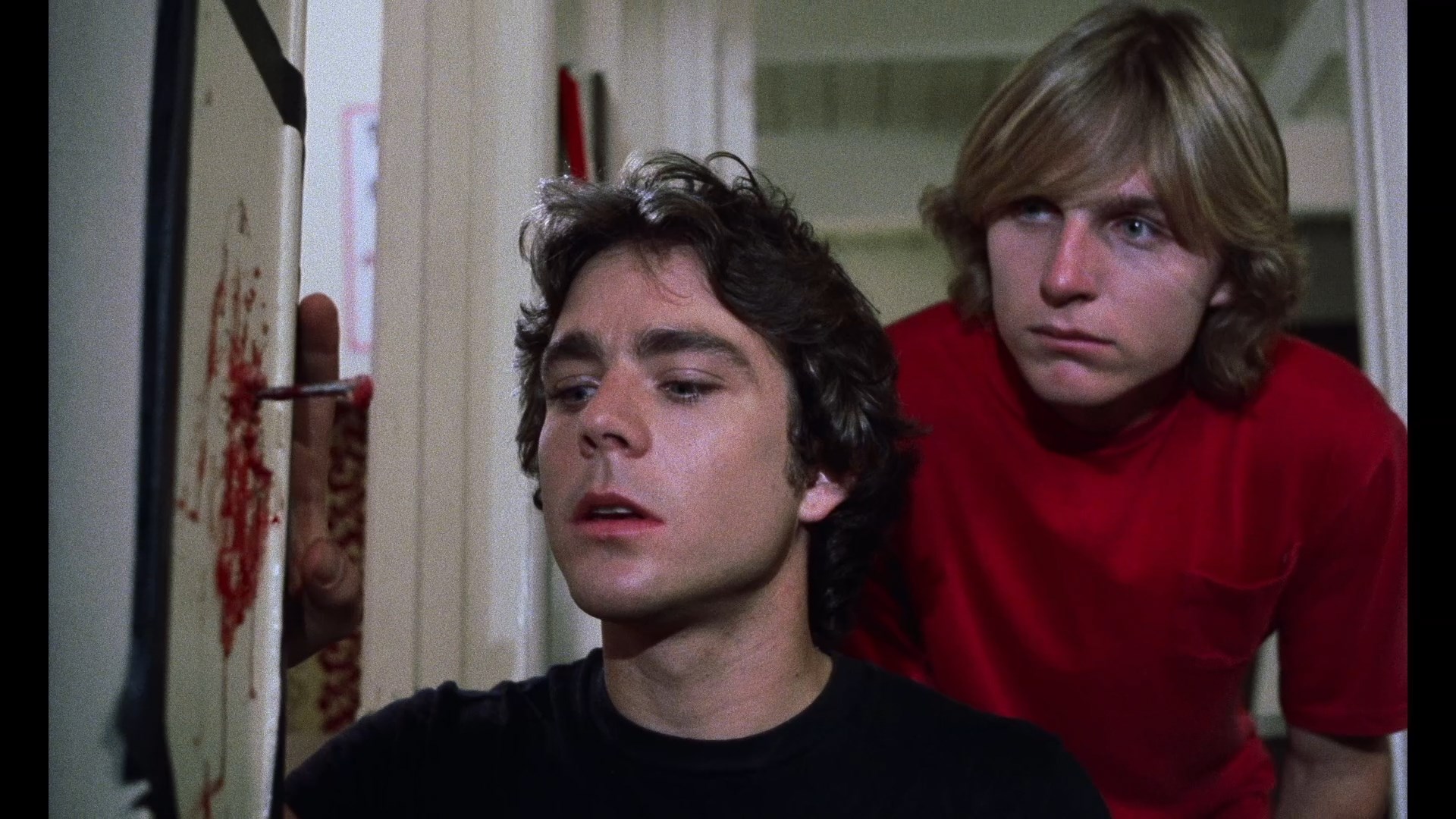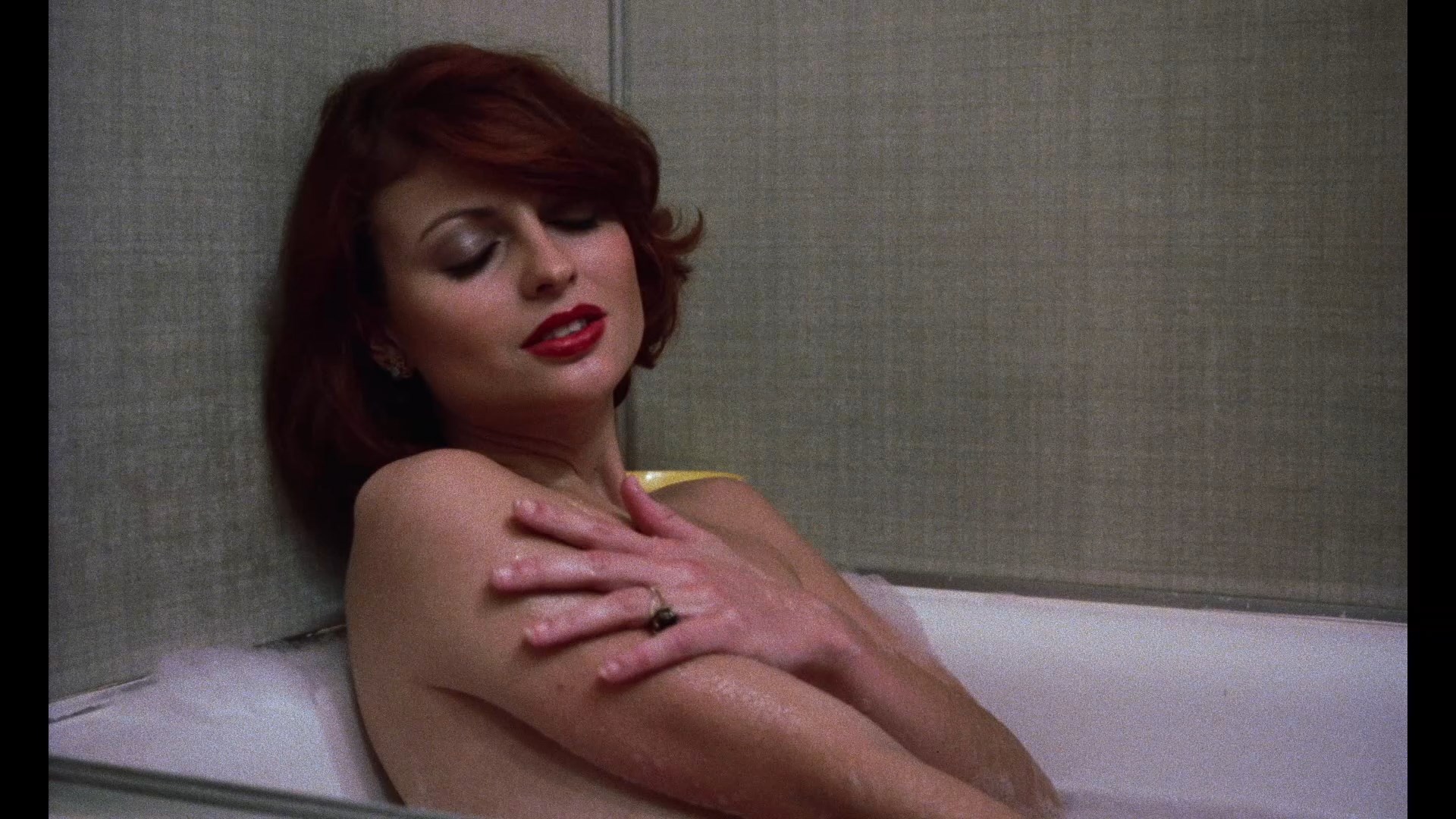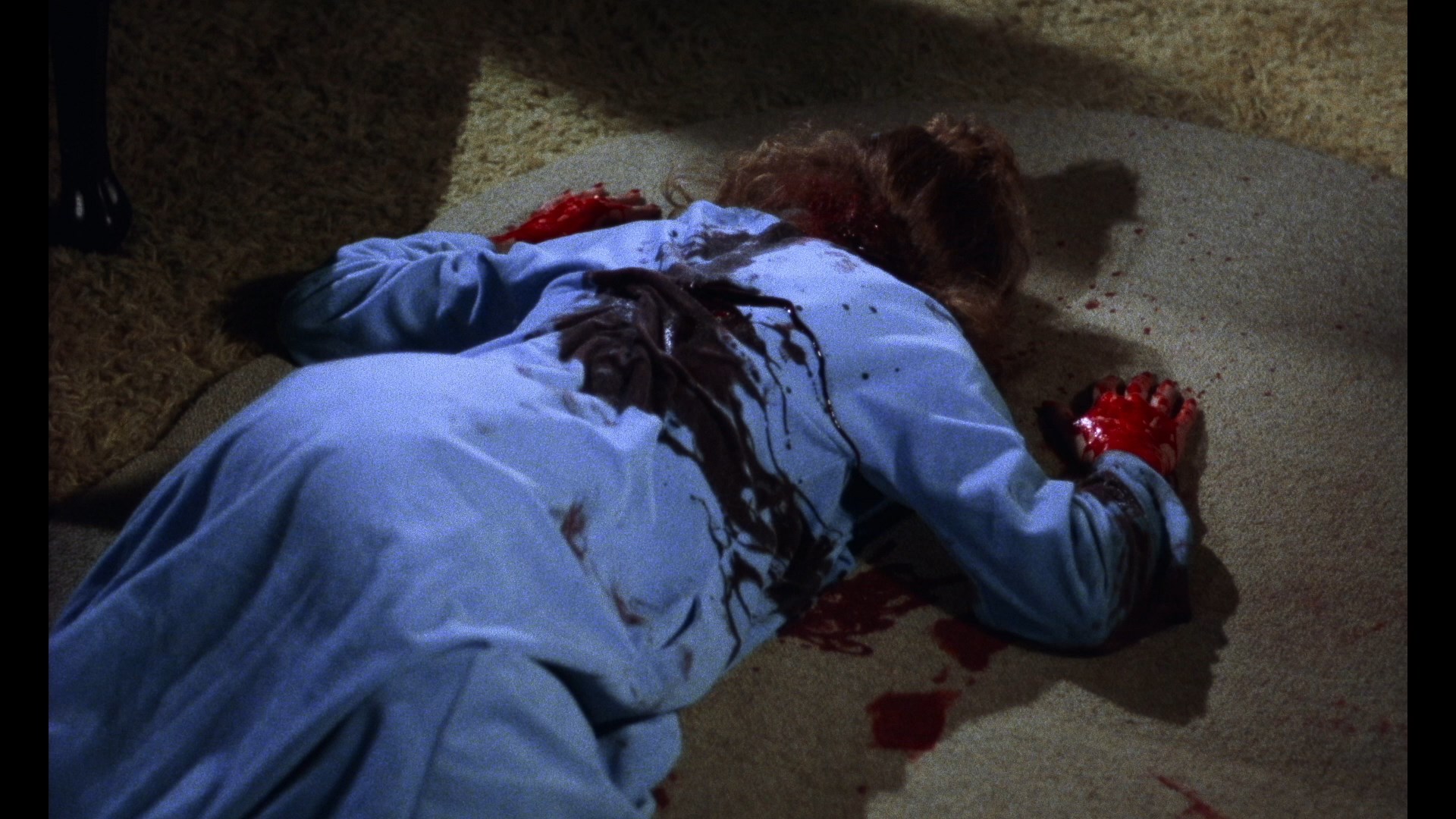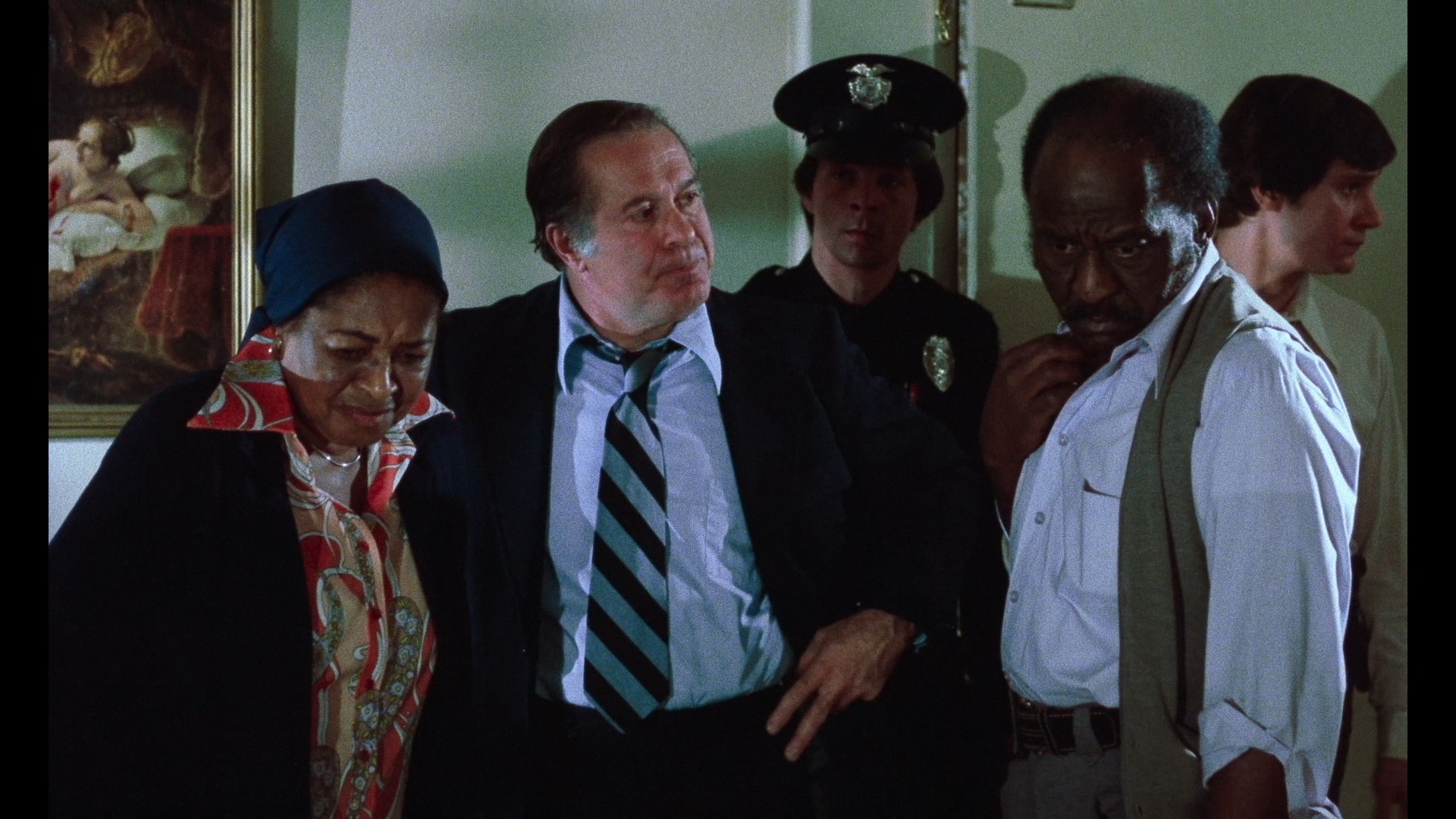



 1970s, the exploding horror movie market was
1970s, the exploding horror movie market was  beginning to split into three camps: glossy Hollywood entertainments, straightforward slasher films inspired by Halloween and Black Christmas, and sleazy studies in psychopathic behavior strongly inspired by roughie exploitations films of the previous decade. The line between these three became blurred at times, with critics often confusing the latter two. Often cited as a slasher film due to its notorious opening half hour, The Toolbox Murders then evolves into more of a post-roughie sleaze film in closer company with the likes of Maniac and Don't Answer the Phone whose ancestors include disreputable titles like Forced Entry and the works of Michael and Roberta Findlay. For that reason, this film often confuses horror fans expecting a traditional stalk-and-slash film but instead wind up getting something far more complicated and disturbing instead.
beginning to split into three camps: glossy Hollywood entertainments, straightforward slasher films inspired by Halloween and Black Christmas, and sleazy studies in psychopathic behavior strongly inspired by roughie exploitations films of the previous decade. The line between these three became blurred at times, with critics often confusing the latter two. Often cited as a slasher film due to its notorious opening half hour, The Toolbox Murders then evolves into more of a post-roughie sleaze film in closer company with the likes of Maniac and Don't Answer the Phone whose ancestors include disreputable titles like Forced Entry and the works of Michael and Roberta Findlay. For that reason, this film often confuses horror fans expecting a traditional stalk-and-slash film but instead wind up getting something far more complicated and disturbing instead.
 sordid Tennessee Williams
sordid Tennessee Williams  play relocated to the San Fernando Valley circa '78. At an apartment complex seemingly populated only by alcoholic or promiscuous women, landlord-handyman Vance Kingsley (Mitchell) is perplexed by the fact that young ladies are being brutally murdered two nights in a row. Meanwhile one of the teenage tenants, Laurie (Ferdin), has gone missing, and her blond surfer dude brother Joey (Beauvy) teams up with Vance's twitchy nephew, Kent (Eure), to find out what's really going on.
play relocated to the San Fernando Valley circa '78. At an apartment complex seemingly populated only by alcoholic or promiscuous women, landlord-handyman Vance Kingsley (Mitchell) is perplexed by the fact that young ladies are being brutally murdered two nights in a row. Meanwhile one of the teenage tenants, Laurie (Ferdin), has gone missing, and her blond surfer dude brother Joey (Beauvy) teams up with Vance's twitchy nephew, Kent (Eure), to find out what's really going on. 
 start of the third act, culminating in a big fiery confrontation that, strangely enough, is completely ignored or forgotten by both the characters and script just moments later. Then there's the finale, oddly the least violent sequence in the film, which also manages to be the most sordid as it pairs up the squeaky-clean Ferdin and Eure for a resolution that will leave any nostalgic '70s TV fans in a state of extreme unease. Of course it all closes with a disclaimer trying to pass off the events as a true story (a la Texas Chainsaw), but no one really bought it. Oh, and this has nothing to do with the 2003 Tobe Hooper remake of the same title, which is another subject altogether.
start of the third act, culminating in a big fiery confrontation that, strangely enough, is completely ignored or forgotten by both the characters and script just moments later. Then there's the finale, oddly the least violent sequence in the film, which also manages to be the most sordid as it pairs up the squeaky-clean Ferdin and Eure for a resolution that will leave any nostalgic '70s TV fans in a state of extreme unease. Of course it all closes with a disclaimer trying to pass off the events as a true story (a la Texas Chainsaw), but no one really bought it. Oh, and this has nothing to do with the 2003 Tobe Hooper remake of the same title, which is another subject altogether.
 the packaging indicates
the packaging indicates  something might have been going on behind the scenes. In any case, their DVD presentation was quite fine for the time and paved the way for their Blu-ray upgrade in 2010, a stellar presentation featuring one of the best catalog horror transfers around at the time. While the commercial elements of The Toolbox Murders are all rendered with startling clarity here, the film is also much more enjoyable in HD for its most aesthetic quality as a picture-perfect portrait of '70s Valley life. Many apartments around Burbank still look the same (yes, even down to the interiors and wall heaters), but the presentation here is a nonstop cavalcade of vintage carpeting, wall ornamentation, neon-saturated bars, and lo-tech garages. The immaculate image quality might indicate something that was shot yesterday, but the production design clearly gives the game away. Top marks all around. The audio aspect isn't quite as impressive given the very limited nature of the original sound recording (Eure and Beauvy tend to mumble or slur some of their lines, so prepare to flip on those optional English, Spanish or French subtitles from time to time), but the music sounds great and all the screaming comes through loud and clear. The center-heavy DTS-HD 7.1 mix offers a bit of minor ambient support to the more densely-mixed portions, but it really isn't all that different from the original mono mix (with a third 5.1 option
something might have been going on behind the scenes. In any case, their DVD presentation was quite fine for the time and paved the way for their Blu-ray upgrade in 2010, a stellar presentation featuring one of the best catalog horror transfers around at the time. While the commercial elements of The Toolbox Murders are all rendered with startling clarity here, the film is also much more enjoyable in HD for its most aesthetic quality as a picture-perfect portrait of '70s Valley life. Many apartments around Burbank still look the same (yes, even down to the interiors and wall heaters), but the presentation here is a nonstop cavalcade of vintage carpeting, wall ornamentation, neon-saturated bars, and lo-tech garages. The immaculate image quality might indicate something that was shot yesterday, but the production design clearly gives the game away. Top marks all around. The audio aspect isn't quite as impressive given the very limited nature of the original sound recording (Eure and Beauvy tend to mumble or slur some of their lines, so prepare to flip on those optional English, Spanish or French subtitles from time to time), but the music sounds great and all the screaming comes through loud and clear. The center-heavy DTS-HD 7.1 mix offers a bit of minor ambient support to the more densely-mixed portions, but it really isn't all that different from the original mono mix (with a third 5.1 option  coming
coming  somewhere in between). Apart from ditching the DVD's still gallery, the Blu-ray carries over all the extras including an entertaining commentary track with a very game Ferdin, late cinematographer Gary Graver (who shot hundreds of beloved drive-in films when he wasn't moonlighting as an adult film director), and producer Tony DiDio, all of whom look back fondly on the film and talk about their various showbiz experiences while occasionally reacting hysterically to the feature at hand. Walter/Nichols appears for the on-camera featurette, "I Got Nailed in The Toolbox Murders," in which she talks in depth about her famous demise and one of its most famous fans as well as her subsequent careers in showbiz. The disc rounds out with the theatrical trailer, a particularly ominous TV spot, and radio spots.
somewhere in between). Apart from ditching the DVD's still gallery, the Blu-ray carries over all the extras including an entertaining commentary track with a very game Ferdin, late cinematographer Gary Graver (who shot hundreds of beloved drive-in films when he wasn't moonlighting as an adult film director), and producer Tony DiDio, all of whom look back fondly on the film and talk about their various showbiz experiences while occasionally reacting hysterically to the feature at hand. Walter/Nichols appears for the on-camera featurette, "I Got Nailed in The Toolbox Murders," in which she talks in depth about her famous demise and one of its most famous fans as well as her subsequent careers in showbiz. The disc rounds out with the theatrical trailer, a particularly ominous TV spot, and radio spots. dynamic here throughout as well, and in addition to the 5.1 and 1.0 mono mixes, there's a new Dolby Atmos track that's still fairly center-centric for the most part but
dynamic here throughout as well, and in addition to the 5.1 and 1.0 mono mixes, there's a new Dolby Atmos track that's still fairly center-centric for the most part but  delivers some fun separation effects at times. That's especially evident during the exterior scenes when you get whooshing ambient car sounds all around and above, giving a nice spatial effect. English SDH, French, and Spanish subtitles are provided, while the audio commentary is ported over; there's also a new commentary featuring Troy Howarth and this writer, which can't be assessed here (obviously) but will hopefully prove entertaining and informative. Both discs also sport the trailer, TV spot, and radio spots as well, while the Blu-ray ports over "I Got Nailed..." and adds the second "Flesh and Blood" and "Slashback Memories" from the 88 Films release. However, the Blu-ray also features some substantial new goodies as well starting with "Drill Sergeant" (20m17s), which Donnelly talking about this film pulled together on a very low budget compared to his TV assignments, the approach of composer George Deaton (who pops up in a cameo in the film) and his joyful response to the score, his memories of Gary Graver, the execution of that final crane shot, his positive experience with Mitchell, his love of tools, and the casting of his brother Tim. In "Tools of the Trade" (26m47s), Eure cheerfully remembers jumping at the chance to do a horror role while working on Days of Our Lives, the little foreshadowing touches he brought to his character, the recovery he had to go through jumping back to TV, and the inspiration he took from 1976's King Kong for his favorite scene. The video essay "They Know I Have Been Sad" (19m27s) by Amanda Reyes (who narrates) and Chris O'Neill takes a perceptive look at the film contrasting its hostile critical reception with its weirdly resonant look at modern urban isolation and loneliness within its unusual triptych structure. Also included is a new and greatly expanded gallery of 118 posters and stills.
delivers some fun separation effects at times. That's especially evident during the exterior scenes when you get whooshing ambient car sounds all around and above, giving a nice spatial effect. English SDH, French, and Spanish subtitles are provided, while the audio commentary is ported over; there's also a new commentary featuring Troy Howarth and this writer, which can't be assessed here (obviously) but will hopefully prove entertaining and informative. Both discs also sport the trailer, TV spot, and radio spots as well, while the Blu-ray ports over "I Got Nailed..." and adds the second "Flesh and Blood" and "Slashback Memories" from the 88 Films release. However, the Blu-ray also features some substantial new goodies as well starting with "Drill Sergeant" (20m17s), which Donnelly talking about this film pulled together on a very low budget compared to his TV assignments, the approach of composer George Deaton (who pops up in a cameo in the film) and his joyful response to the score, his memories of Gary Graver, the execution of that final crane shot, his positive experience with Mitchell, his love of tools, and the casting of his brother Tim. In "Tools of the Trade" (26m47s), Eure cheerfully remembers jumping at the chance to do a horror role while working on Days of Our Lives, the little foreshadowing touches he brought to his character, the recovery he had to go through jumping back to TV, and the inspiration he took from 1976's King Kong for his favorite scene. The video essay "They Know I Have Been Sad" (19m27s) by Amanda Reyes (who narrates) and Chris O'Neill takes a perceptive look at the film contrasting its hostile critical reception with its weirdly resonant look at modern urban isolation and loneliness within its unusual triptych structure. Also included is a new and greatly expanded gallery of 118 posters and stills.2022 Blu-ray
2010 Blu-ray
![]()